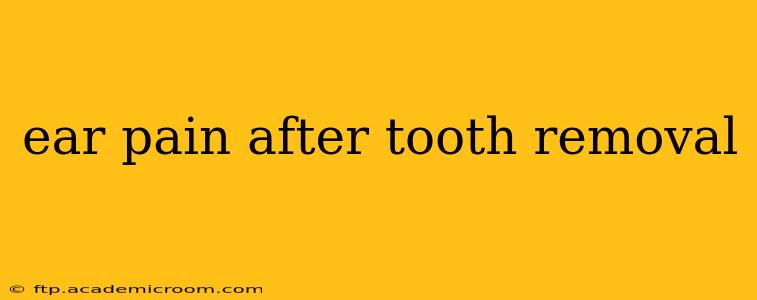Experiencing ear pain after a tooth extraction is more common than you might think. While it can be alarming, it's often a temporary side effect related to the procedure itself. Understanding the causes, potential treatments, and preventative measures can alleviate anxiety and promote faster healing. This comprehensive guide will address common concerns and provide you with the information you need to manage this discomfort effectively.
What Causes Ear Pain After Tooth Extraction?
The connection between your teeth and your ears might not be immediately obvious, but they're closer than you think. Nerve pathways and anatomical proximity contribute to referred pain, meaning pain originating in one area is felt in another. Several factors can lead to ear pain after tooth extraction:
-
Inflammation and Swelling: Post-extraction swelling is normal. However, significant inflammation can press on nerves and cause radiating pain into the ear. This is particularly true for extractions of wisdom teeth or molars, due to the proximity to the jaw joint and ear canal.
-
Dry Socket: This painful complication occurs when the blood clot protecting the extraction site dislodges or dissolves prematurely. The exposed bone and nerve endings can cause intense pain, often extending to the ear.
-
Sinus Infection (for upper teeth): The roots of upper teeth are close to the sinuses. Extraction of an upper tooth can potentially disrupt the sinus lining, leading to infection and subsequent ear pain. This is because the sinuses and ears are connected via the Eustachian tube.
-
Infected Wound: An infection at the extraction site can spread, causing pain and inflammation that radiates to the ear.
-
Referred Pain: As mentioned, nerves in the jaw can transmit pain signals to other areas, including the ear. The intensity of referred pain can vary widely.
Is Ear Pain After Tooth Extraction Normal?
Some degree of discomfort, including mild earache, is considered relatively normal in the immediate aftermath of a tooth extraction. However, severe or persistent ear pain warrants immediate medical attention. This could signal a complication like dry socket or infection. Mild discomfort usually subsides within a few days with proper care.
How Long Does Ear Pain After Tooth Extraction Last?
The duration of ear pain varies greatly depending on the individual, the complexity of the extraction, and the presence of any complications. For most, it resolves within 3-7 days. If the pain persists beyond a week or worsens, consult your dentist or oral surgeon.
What Can I Do to Relieve Ear Pain After Tooth Extraction?
Several at-home remedies can help manage mild ear pain:
-
Over-the-counter pain relievers: Ibuprofen or acetaminophen can reduce pain and inflammation. Follow the dosage instructions carefully.
-
Cold compresses: Applying a cold compress to the affected cheek can help reduce swelling and numb the area, potentially easing ear pain.
-
Rest: Allowing your body to rest and heal is crucial. Avoid strenuous activity.
-
Gentle rinsing: Your dentist will likely provide instructions on rinsing your mouth gently with saltwater to keep the area clean and prevent infection.
When Should I See a Dentist or Oral Surgeon About Ear Pain After Tooth Extraction?
Seek immediate dental attention if you experience:
- Severe ear pain: Pain that is intense and doesn't respond to over-the-counter pain relief.
- Persistent ear pain: Pain lasting more than a week.
- Fever or chills: These could indicate an infection.
- Increased swelling: Significant swelling that worsens over time.
- Pus or discharge from the extraction site: A sign of infection.
- Difficulty opening your mouth: This could indicate trismus (lockjaw), a complication of extraction.
How Can I Prevent Ear Pain After Tooth Extraction?
While not all cases are preventable, following your dentist's instructions carefully can significantly reduce the risk:
- Follow post-operative instructions meticulously: This includes medication regimens, rinsing instructions, and activity restrictions.
- Maintain good oral hygiene: Brushing and flossing gently around the extraction site (once healing allows) helps prevent infection.
- Avoid smoking: Smoking hinders healing and increases the risk of complications.
- Avoid using a straw: The sucking motion can dislodge the blood clot.
By understanding the potential causes, treatments, and preventative measures, you can navigate the recovery process more confidently. Remember, seeking professional advice promptly is crucial for addressing any concerning symptoms. Always consult your dentist or oral surgeon for personalized guidance and treatment.
